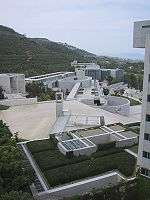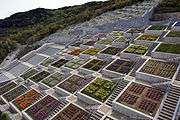Awaji Yumebutai
The Awaji Yumebutai (淡路夢舞台) is a complex of conference center, hotel and memorial in Awaji, Hyōgo, built near the epicenter of the 1995 Great Hanshin Awaji earthquake. It was designed by Tadao Ando,[1][2] who had begun planning for the project (as a park) prior to the earthquake.[3] The hotel is operated as the Westin Awaji Island Resort.

Etymology
Yumebutai (夢舞台) literally means "Dream Stage",[4] from yume (夢, "dream") and butai (舞台, "performance stage, setting"). Metaphorically "a place in which to dream",[5] the name refers to the aim of restoring the ecology of the island,[6] whose soil had been partly removed for land reclamation in Osaka.[3]

Hyakudanen
One of the most distinctive features in the complex is the Hyakudanen (百段苑, "hundred stepped gardens"), a group of 100 flower beds (small square gardens) on an incline, arranged in grids spread over several levels. The "hundred" refers to the number of mini-gardens and not the steps, as there are 1575 steps and 235 flights.[3]
See also
- Miracle Planet Museum of Plants, a nearby greenhouse
- The 100 Views of Nature in Kansai
References
- "About Yumebutai". Awaji Yumebutai International Conference Center. 2006. Retrieved 2008-03-23.
- Martin Bermudez. "Geophysical and Seismic Analysis: Of Two Architectural Wonders". Geolabs-Hawaii Hillside Design Laboratory at the University of Hawaii School of Architecture. Archived from the original on 2008-05-28. Retrieved 2008-03-23.
- Bos, Karel. "The 100 step garden (Hyakudan-en)".
- Jodidio, Philip (2001). Architecture d'aujourd'hui. Taschen. p. 18. ISBN 978-3-8228-6065-6.
- "[Article title unknown]". World Architecture. Grosvenor Press Int'l (87–91): 79. 2000.
[...] meaning 'place of dreams' or 'place in which to dream' - is the name given by Tadao Ando to his latest, and largest, work.
- Ponti, Gio (2000). Domus. Casa ed. Domus. p. 27.
The dream here is about the ecological restoration of a part of the isle of Awaji [..]
External links
| Wikimedia Commons has media related to Awaji Yumebutai. |
- Official site (in Japanese and English)
- The 100 step garden (Hyakudan-en): photos & background
- The Westin Awaji Island Resort & Conference Center: official site of the hotel